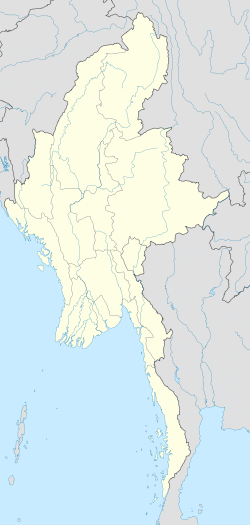Mong Ko
Mong Ko
မုံးကိုးမြို့ 勐古 Monekoe, Man Guo, Man Kan | |
|---|---|
Town | |
 Mong Ko, photographed in Manghai, China | |
| Coordinates: 24°6′1″N 98°18′50″E / 24.10028°N 98.31389°E | |
| Country | |
| State | |
| District | Mu Se District |
| Township | Mu Se Township |
| Elevation | 1,480 ft (450 m) |
| Population | |
• Town | 24,565 |
| • Urban | 8,847 |
| • Rural | 15,718 |
| Time zone | UTC+6:30 (MMT) |
Mong Ko (Burmese: မုံးကိုးမြို့; Chinese: 勐古; pinyin: Měng gǔ), sometimes spelled Mongko or Monekoe and also known as Man Kan, Man Guo[3] and Panglong,[4] is a town in Mu Se Township, Mu Se District, northern Shan State, Myanmar.
Like many towns in the region, Mong Ko is known to be a hotspot for drug production and trade.[5]
Geography
[edit]Mong Ko lies by the China–Myanmar border, 25 km east of Pang Hseng (Kyu Koke).[6] There is a border checkpoint in the town.[7] The town on the Chinese part of the border is Manghai in Mangshi county-level city, Yunnan Province.
History
[edit]The Communist Party of Burma (CPB) entered Shan State on New Year Day 1968, captured Mong Ko, and established the first war zone ‘303’ of the CPB North-East Command (NEC). This was quickly followed by ‘404’ in Kokang substate winning over the local warlord Pheung Kya-shin.[8]
For 20 years Pheung controlled Kokang as a member of the Communist Party of Burma.[9] In 1989, however, the CPB split up[9] and Pheung established his own army, the Myanmar National Democratic Alliance Army,[10] with which he mutinied and captured Mong Ko town.[11] After this he signed a cease-fire with the military junta, which allowed the Kokang army to retain their weapons, and established an autonomous Kokang region as the "First Special Region" of Myanmar.[10][12]
The Northern Alliance launched an offensive to capture Mong Ko on 20 November 2016.[13] The town was recaptured by the Myanmar Army in December 2016.[14]
On November 7 2023 the Brotherhood Alliance, which consists of most of the same members of the Northern Alliance, established control over the town, raising the Myanmar National Democratic Alliance Army (MNDAA) flag over the border bridge.[15]
Further reading
[edit]References
[edit]- ^ GoogleEarth
- ^ The 2014 Myanmar Population and Housing Census Highlights of the Main Results Census Report Volume 2 – A. Department of Population Ministry of Immigration and Population. 2015. p. 64.
- ^ Shelby Tucker, Among Insurgents: Walking Through Burma. p. 27
- ^ "Panglong". Mapcarta. Retrieved 22 May 2016.
- ^ Peter John Perry, Myanmar (Burma) Since 1962: The Failure of Development. p. 152
- ^ Möng Ko: Burma
- ^ "Restricted Area in Myanmar (Burma)". Archived from the original on 2016-08-21. Retrieved 2016-05-22.
- ^ Smith, Martin (1991). Burma – Insurgency and the Politics of Ethnicity. London and New Jersey: Zed Books.
- ^ a b Lintner, Bertil; Chiang Mai (28 June 1990). "A fix in the making" (PDF). Far Eastern Economic Review. Retrieved 29 August 2009.[permanent dead link]
- ^ a b 果敢乱局当前 传“果敢王”已逃离 (in Chinese). 南国都市报 (Southern Metropolitan). 29 August 2009. Retrieved 29 August 2009.
- ^ Tucker, Shelby (2001). Burma: The curse of independence. Pluto Press. p. 176. ISBN 978-0-7453-1541-6.
- ^ "Tense situation in N. Myanmar's Shan state prevails". Xinhua. 28 August 2009. Archived from the original on August 30, 2009. Retrieved 27 August 2009.
- ^ "Armed groups renew attacks on military post in N. Myanmar: authorities – SYCB". www.sycbyouth.org. Retrieved 2017-12-21.
- ^ Burmese army recaptures Mongko – SYCB
- ^ (၇) နှစ်တိုင်တိုင်ကျော်ဖြတ်ခဲ့ပြီးနောက် မုံးကိုးနယ်စပ်ဂိတ်မှာ MNDAA ၏ အလံကိုနောက်တစ်ကြိမ် ထပ်မံထူထောင်နိုင်ခဲ့ | By The Kokang | Facebook, retrieved 2023-11-07

